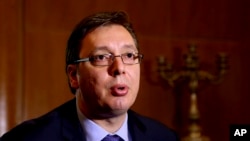Serbian Prime Minister Aleksandar Vucic said Tuesday that he would represent Serbia at ceremonies marking the 20th anniversary of the Srebrenica massacre, the bloodiest episode in the Bosnian civil war of the early 1990s.
On July 11, 1995, toward the end of Bosnia's 1992-95 war, Bosnian Serb forces overran Srebrenica, a U.N.-designated "safe area." About 8,000 Muslim men and boys were killed in the days that followed. The U.N. war crimes tribunal in The Hague has called the killings genocide.
Vucic, who was well-known as a fierce Serbian nationalist, said that "It is time to show that we are ready for reconciliation and that we are ready to bow our head before other people's victims."
The prime minister said Serbia would sentence each criminal who committed "horrible crimes." But he and Bosnian Serb officials still refuse to call the Srebrenica massacre a genocide — legally defined as the deliberate attempt to wipe out an ethnic or religious group.
The U.N. Security Council postponed until Wednesday a vote on a British resolution to declare the Srebrenica deaths genocide because Russia, which shares many cultural and religious ties with Serbs, threatened to block the measure.
The council president, New Zealand's Ambassador Gerard Jacobus van Bohemen, said diplomats wanted to encourage as much unity as possible on the resolution.
British Ambassador Matthew Rycroft said the resolution is not a political statement, but a legal one, and is not anti-Serbian.
Serbia has warned that the resolution will only widen ethnic divides in neighboring Bosnia.
The row over the resolution has created an atmosphere of distrust in Bosnia and overshadowed the Srebrenica commemoration scheduled for Saturday, when 136 newly identified victims will be laid to rest next to the 6,241 already buried at a joint cemetery.
Twenty years after the U.S.-brokered Dayton peace accord ended the war, Bosnia remains fragile, with a weak economy, an unwieldy power-sharing system and tensions between its two regions, the Bosniak-Croat Federation and the Serb Republic.
The president of the Bosnian Serb republic, Milorad Dodik, who has long called for its secession from Bosnia, has warned that the adoption of the resolution would mean a "disintegration of Bosnia."
Serbian President Tomislav Nikolic also has sent a letter to Britain's Queen Elizabeth, asking her to persuade the British government to drop its initiative.
His foreign minister, Ivica Dacic, added, "I expect the countries who took part in making the Dayton agreement ... to take no decisions that could destabilize the situation [in Bosnia]."
Some information for this report came from Reuters.





